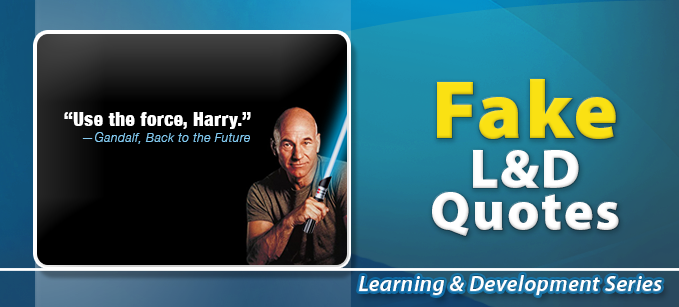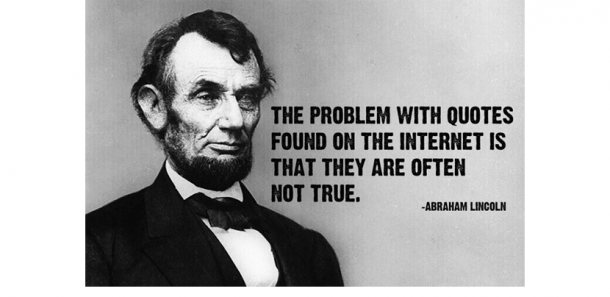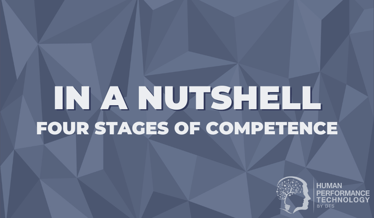10 Fake L&D Quotes

The Internet makes it easy to spread pithy quotes across the globe like wildfire. Sometimes, these quote-memes are harmless paraphrasing of something virtually identical to what the author originally said or wrote, but there are other times when an attribution is way, way off base. It's actually kind of disturbing to discover just how often quotes are credited to the wrong people and totally misrepresent their beliefs or the context in which something was said. In some very rare instances, a misattribution can even manage to convince the new author of being the original author.
John Green, the bestselling author and creator of educational videos watched by millions on YouTube, made a very funny admission in a video earlier this year describing the story of how he blindly assumed he’d written a popular quote on the Internet because so many people were crediting it to him. The quote, "I'm in love with cities I've never been to and people I've never met," was not one that Green remembered writing so he eventually decided to download an illegal pirated copy of one of his own books in order to perform a search of the text but couldn't locate it anywhere. As it turned out, a 13-year-old girl wrote the quote on a site where she often shared quotes from Green and someone else likely assumed (mistakenly) that it was just another John Green quote. Ironically, the girl who was the author of the quote was later accused of stealing it from Green without giving proper citation even though it was Green who was the thief all along!
Mark Twain once said, “A lie can travel halfway around the world before the truth has a chance to get its pants on.”
Only he didn’t. It's another fake quote. (See the Quote Investigator if you’re interested in the origin of this one.)
There are dozens of fake quotes that find their way into organisations and L&D departments. Below are just a few that we frequently notice.
10 Fake Quotes
1) “It is not the strongest of the species that survive, nor the most intelligent, but the one most responsive to change.” — Charles Darwin
This quote (and several similar variants) is frequently used in presentations related to innovation, technology and change management. There is no known work authored by Darwin that incorporates this sentence. The earliest source that used this type of phrasing has been traced to a university professor called Leon C. Megginson.
2) "I hear and I forget. I see and I remember. I do and I understand." — Confucius
and;
3) "Tell me and I forget, teach me and I may remember, involve me and I learn.” — Ben Franklin
The origin of both of these quotes is unknown. They are likely mutations of a quote from a Chinese philosopher called Xunzi: "Not hearing is not as good as hearing, hearing is not as good as seeing, seeing is not as good as knowing, knowing is not as good as acting; true learning continues until it is put into action."
4) “640K ought to be enough for anyone.” — Bill Gates
The 640k refers to the amount of computer memory. It is often used to show that, even though Bill Gates is considered to be among the smartest and most tech-savvy people on the planet, even he couldn’t foresee the radical technology shifts in home computing. Gates has publicly denied ever saying this: "I've said some stupid things and some wrong things, but not that. No one involved in computers would ever say that a certain amount of memory is enough for all time.”
5) “Logic will get you from A to B. Imagination will take you everywhere.” — Albert Einstein
6) “The definition of insanity is doing the same thing over and over and expecting different results.” — Albert Einstein
7) “Everyone is a genius. But if you judge a fish by its ability to climb a tree, it will live its whole life believing that it is stupid.” — Albert Einstein
These are just three ubiquitous quotes that Einstein never said (or at least there is no known record of). Einstein is notorious for being misquoted probably more than any other famous person and for having his name co-opted by people trying to make an idea sound more credible.
8) “If I had asked people what they wanted, they would have said faster horses.” — Henry Ford
There is no evidence Ford ever said this. See this HBR article.
9) “Culture eats strategy for breakfast.” — Peter Drucker
Some people believe it is the kind of thing Drucker might have said, however there is no evidence he ever used this specific phrase. This quote was popularised by the CEO of Ford Motor Company, Mark Fields.
10) "The only true wisdom is in knowing you know nothing." — Socrates
Not only is there no record of Socrates ever saying this, it’s not representative of what Socrates espoused about the subject of wisdom. Skeptic Magazine has an excellent article dedicated to debunking this single quote.
Undoubtably, most of us have been guilty of not properly source checking evidence that we obtained from the web at some stage in our lives. However, if you are using a quote as part of a business presentation, it only takes 10 seconds of Googling to determine if the quote's authorship is under dispute and, if you discover this to be the case, it's as simple as inserting the words "Unknown" or "Anonymous."

Topics:
Learning & Development
Theo Winter
Client Services Manager, Writer & Researcher. Theo is one of the youngest professionals in the world to earn an accreditation in TTI Success Insight's suite of psychometric assessments. For more than a decade, he worked with hundreds of HR, L&D and OD professionals and consultants to improve engagement, performance and emotional intelligence of leaders and their teams. He authored the book "40 Must-Know Business Models for People Leaders."


.png?width=374&name=Nutshell%20-%20Strengths-Based%20Thinking%20(Gallup).png)
We Would Like to Hear From You (0 Comments)